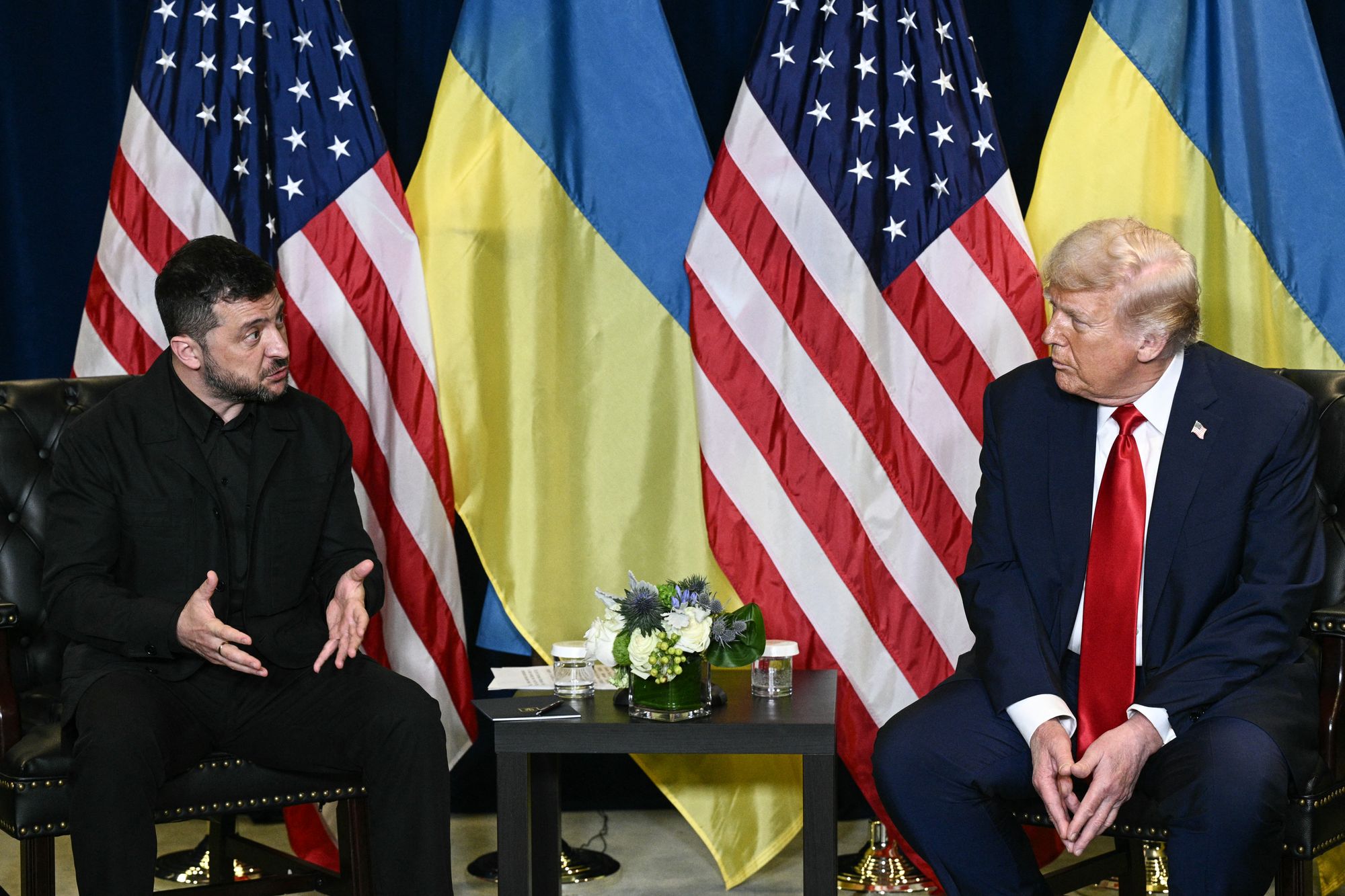The contrast in tone and, at least on the face of it, substance could not be greater. At their notorious meeting in the Oval Office in February, Donald Trump launched an unprecedented public assault, amounting to ritual humiliation, on Volodymyr Zelensky. President Trump angrily told his counterpart that he couldn’t win the war against Russia, saying: “You don’t have the cards right now,” and: “Your country is in big trouble... you’re not winning this.”
But in their latest bilateral, on the fringes of the United Nations General Assembly in New York, things were unmistakably – indeed, unbelievably – calmer and friendlier. As the pair answered questions from the media, the US president was noticeably more assertive on the matter of Nato taking lethal action against Russian aggression, giving a simple “yes” to a query about drones or aircraft being shot down over Poland or elsewhere.
In a post on his social media account after the meeting, Mr Trump went further. Now, unlike a few months ago, he seems to believe that Ukraine can not only win the war, but could recover all the territory lost since 2014. That would mean the return of Crimea to sovereign Ukrainian control, the possibility of which even Mr Zelensky might privately doubt.
Clearly, Mr Trump was more bullish about Ukraine and disparaging about Russia than he has ever been before: “Ukraine [with EU and Nato assistance] would be able to take back their Country in its original form and, who knows, maybe even go further than that! Putin and Russia are in BIG Economic trouble, and this is the time for Ukraine to act,” he wrote on Truth Social, describing Russia as a mere “paper tiger”.

This is all extremely welcome, and it does suggest that, as Mr Trump has periodically indicated, he has lost patience with President Putin. Though he wasn’t critical of the Russian leader personally, and suggested again that Putin and President Zelensky hold talks, the White House is no longer actively collaborating with the Kremlin to impose an unjust and unstable peace treaty on Ukraine, and to hand Russia vast swathes of territory it cannot win on the battlefield. For that, the world should be grateful.
Does it mark a shift in US policy? A U-turn? Is the US about to re-engage with Nato and European security? As ever, when dealing with the world’s most famous former real-estate developer, it pays to be cautious. One immediate corrective to any overoptimism came from the US secretary of state, Marco Rubio, who chose to restate the previous version of the Trump doctrine so far as Ukraine is concerned, saying that the war “cannot end militarily. It will end at a negotiating table.”
We also know, from bitter experience, that President Trump tends to mimic the legendary cushion that bears the impression of the last bottom that sat on it – and he was no doubt impressed by Mr Zelensky’s assessment of the military situation, and of the fragility of the Russian economy and the war machine it supports.
When Mr Trump expressed support for European Nato forces downing Russian aircraft, he also said that whether the US Air Force would join in “would depend” on the circumstances. Further, Mr Trump has been consistent about the war in Ukraine being Europe’s problem and the need for Europe to provide the embattled country with financial and military assistance. There will be no resumption of the massive amounts of aid provided by the Biden administration.
Mr Trump remains adamant that US help in sanctioning Russia cannot be extended while European countries persist in buying Russian oil and gas. He did, though, undertake to pressure Viktor Orban of Hungary, the EU’s most recalcitrant and pro-Moscow member, to get real. If that did come to pass, Mr Trump might extend the secondary penalties imposed on nations and companies that have been helping Russia to dodge its own sanctions.
There are mixed messages here – punitive tariffs were recently imposed on India, but there has been a relaxation of trade restrictions on Belarus, a Russian puppet state and a conduit for illicit imports and exports. There are, therefore, no certainties, and it cannot be guaranteed that the likes of China and India will not simply defy America.
So Ukraine and its allies should not get their hopes up too high. The weakening Russian economy may well prove the undoing of Putin’s “special military operation”, as Mr Trump observes (probably the assessment of his more objective advisers). But no one can be sure how long President Putin’s war economy can sustain itself for – and the extent and continuity of Chinese financial support cannot be predicted.
For the next few months, the most crucial developments may be on the ground, and in particular in the Donbas region, where the Russians are said to be preparing a fresh offensive, focused on the strategically important city of Pokrovsk. As winter draws in, the fighting in the east will be as bitter as anything seen in the conflict so far, and may prove decisive as the fourth anniversary of the invasion arrives next February.
If Mr Trump can be convinced that an end to this cruel war of attrition – an outcome he genuinely craves – can be achieved more quickly through Ukraine visibly winning, then he could be persuaded to be more supportive, picking up the pieces with a weaker Putin once the war is over. That indeed depends on events on the ground, and a more serious commitment to Ukrainian victory from European allies and the wider global “coalition of the willing” that Sir Keir Starmer and Emmanuel Macron have been trying to assemble.
Today, Ukraine has a few more cards in this grim game than it had a few months ago, and Russia is losing some – notably the economic ones, along with Mr Trump’s sympathy. Maybe Russia really will turn out to be a paper tiger. That is, at the very least, cause for some optimism.







